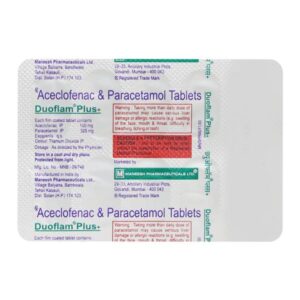IBUPROFEN + PARACETAMOL + CAFFEINE
Ibuprofen: Ibuprofen is a nonsteroidal anti-inflammatory drug (NSAID) commonly used to relieve pain, reduce inflammation, and lower fever. It is available both over-the-counter and by prescription, in various forms such as tablets, capsules, and liquid suspensions.
The primary mechanism of action of ibuprofen is the inhibition of enzymes called cyclooxygenases (COX-1 and COX-2). These enzymes play a role in the production of prostaglandins, which are responsible for pain, inflammation, and fever. By inhibiting their activity, ibuprofen reduces these symptoms.
The recommended dose of ibuprofen varies depending on the condition being treated and the patient’s age and weight. For adults, the typical dose ranges from 200 to 800 mg per dose, with a maximum daily limit of 3200 mg. It is generally recommended to take ibuprofen with food or milk to minimize stomach upset.
Common side effects of ibuprofen include stomach discomfort, heartburn, nausea, and indigestion. It can also cause dizziness, drowsiness, and headache. In rare cases, more serious side effects may occur, such as allergic reactions, stomach ulcers, kidney problems, and cardiovascular events like heart attack or stroke. It is important to follow the recommended dosage and consult a healthcare professional if these side effects occur or persist.
Ibuprofen may interact with certain medications or medical conditions, so it is essential to inform your healthcare provider of any other medications or conditions before using it. It is also not recommended for individuals with a history of allergic reactions to NSAIDs or aspirin, as they may be at an increased risk of adverse effects.
Paracetamol: Paracetamol, also known as acetaminophen, is a commonly used over-the-counter analgesic (pain reliever) and antipyretic (fever reducer). It is widely available in various brand names and formulations.
Paracetamol is primarily used to relieve mild to moderate pain, such as headaches, toothaches, muscle aches, and pain related to common cold and flu. It is also used to reduce fever caused by various conditions.
The exact mechanism of action of paracetamol is not fully understood. It is believed to work by inhibiting the synthesis of prostaglandins in the central nervous system, which are mediators of pain and fever. However, the exact site and mechanism of action are still a topic of ongoing research.
The recommended dose of paracetamol for adults is usually 500-1000 mg every 4-6 hours, up to a maximum of 4000 mg per day. However, the specific dosage may vary depending on the formulation and individual factors such as age and underlying medical conditions. It is important to follow the recommended dose and not exceed the maximum daily limit to avoid potential overdose and liver damage.
While paracetamol is generally considered safe when used as directed, it can have side effects, although they are usually mild. Common side effects include nausea, stomach discomfort, and skin rashes. In rare cases, it may cause a serious allergic reaction or liver damage, especially when taken in excessive doses or in combination with alcohol. Long-term, high-dose use of paracetamol may also increase the risk of liver toxicity.
It is important to read and follow the instructions and warnings on the packaging, and consult a healthcare professional if you have any specific concerns or questions regarding the use of paracetamol, especially if you have liver problems or if you are taking other medications.
Caffeine: Caffeine is a naturally occurring stimulant that is commonly found in beverages such as coffee, tea, and energy drinks. It is also available in the form of tablets and capsules.
Caffeine is primarily used to help increase alertness and combat fatigue. It stimulates the central nervous system, blocking the effects of adenosine, a neurotransmitter that promotes relaxation and sleep. By blocking adenosine, caffeine increases neuronal firing, leading to increased wakefulness and a reduction in feelings of fatigue.
The recommended dose of caffeine varies depending on the individual and the desired effect. For most adults, a moderate dose ranges from 200-300 milligrams, which is roughly equivalent to one to two cups of coffee. However, it’s important to note that caffeine sensitivity varies among individuals, and some people may experience adverse effects even with lower doses.
While caffeine can provide a temporary energy boost, it is not without its side effects. Common side effects of caffeine consumption include increased heart rate, elevated blood pressure, restlessness, anxiety, insomnia, and gastrointestinal disturbances such as nausea and diarrhea. Excessive caffeine intake can also lead to dehydration and dependence, with withdrawal symptoms such as headaches and irritability when consumption is discontinued abruptly.
It is essential to be mindful of caffeine intake and to moderate consumption based on individual tolerance and health conditions. It is also worth noting that caffeine may interact with certain medications, such as certain antibiotics, antidepressants, and blood thinners, so it is advisable to consult with a healthcare professional before using caffeine alongside any prescription drugs.

